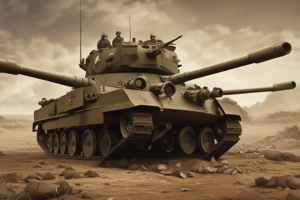Podcast
Questions and Answers
What was one of the causes of tensions among European nations leading up to World War I?
What was one of the causes of tensions among European nations leading up to World War I?
- Expansion of territories through imperialism (correct)
- Global economic cooperation
- Increased emphasis on diplomacy
- Rapid technological advancements
Which factor contributed to the growth of nationalist sentiments in the prelude to World War I?
Which factor contributed to the growth of nationalist sentiments in the prelude to World War I?
- Religious conflicts
- Identification with nation-states (correct)
- Economic equality
- Promotion of global citizenship
How did the arms race impact the geopolitical landscape before World War I?
How did the arms race impact the geopolitical landscape before World War I?
- Reduced militarization of nations
- Decreased tensions between rival powers
- Led to increased military capabilities and tensions (correct)
- Promoted peaceful resolutions of disputes
What role did complex alliances play in the lead-up to World War I?
What role did complex alliances play in the lead-up to World War I?
Which event is often considered the immediate cause of World War I?
Which event is often considered the immediate cause of World War I?
How did the concept of imperialism contribute to the tensions in Europe prior to World War I?
How did the concept of imperialism contribute to the tensions in Europe prior to World War I?
Which event prompted Britain to enter World War I?
Which event prompted Britain to enter World War I?
What significant consequence of World War I is reflected in the rise of new states like Czechoslovakia?
What significant consequence of World War I is reflected in the rise of new states like Czechoslovakia?
Which country withdrew from World War I after the Bolshevik Revolution in 1917?
Which country withdrew from World War I after the Bolshevik Revolution in 1917?
What was the purpose of the League of Nations established after World War I?
What was the purpose of the League of Nations established after World War I?
Which event officially ended hostilities between the Allied forces and the Central Powers in World War I?
Which event officially ended hostilities between the Allied forces and the Central Powers in World War I?
What factor contributed to Germany's economic instability and resentment towards the West after World War I?
What factor contributed to Germany's economic instability and resentment towards the West after World War I?
Flashcards are hidden until you start studying
Study Notes
World War I
In the first half of the 20th century, Europe was caught up in two major wars—World War I and World War II. While both conflicts were global in reach, they are often discussed separately due to their distinct political contexts and consequences. This text will focus on World War I (also known as WWI or the Great War), which lasted from 1914 until 1918.
Causes of World War I
The causes of World War I can be traced back to several interconnected factors:
-
Imperialism: Many European countries expanded their territories by colonizing other parts of the world. This led to tensions among these nations over resources and territory.
-
Nationalism: As people began identifying more closely with their nation-states, nationalist sentiments grew, leading to increased competition between rival powers.
-
Arms Race: In response to growing military capabilities and expanding colonial empires, many nations engaged in an arms race, further increasing tensions and militarization.
-
Alliances: Complex alliances formed among European nations, creating a web of connections that could easily unravel into conflict if one alliance threatened another.
-
Assassination: The assassination of Archduke Franz Ferdinand, heir to the throne of Austria-Hungary, is commonly cited as the immediate cause of war, although it was just one trigger amidst a complex mix of factors.
Key Events and Milestones
Some key events during World War I include:
-
July 28, 1914: Austria-Hungary declares war on Serbia following the Archduke's assassination, sparking the outbreak of war.
-
August 4, 1914: Germany invades Belgium in order to cross its neutral territory, thus bringing Britain into the war against Germany.
-
December 6, 1917: Russia withdraws from the war after the Bolshevik Revolution, severely weakening the Central Powers and encouraging peace talks.
-
April 6, 1917: America enters the war on the side of the Allies, providing significant financial support and manpower.
-
November 11, 1918: An armistice is signed, officially ending hostilities between the Allied forces and the Central Powers.
Consequences of World War I
The consequences of World War I were profound and far-reaching:
-
Political Changes: There were significant shifts in the political landscape, including the collapse of four great empires (Austria-Hungary, Germany, Ottoman Turkey, and Russia) and the rise of new states (for example, Czechoslovakia).
-
Treaty of Versailles: The Treaty of Versailles imposed severe penalties on Germany, contributing to its economic instability and resentment towards the West, which would later play a role in World War II.
-
League of Nations: Established after the war to prevent future conflicts, the League of Nations failed to stop aggression, such as Japan's invasion of Manchuria and Italy's invasion of Ethiopia.
-
Rise of Fascism: Weakened by the war, many European countries turned to authoritarian regimes like fascism and communism, setting the stage for World War II.
World War I remains a tragic reminder of the horrors of modern warfare and the destructive power of nationalistic fervor and imperial ambition.
Studying That Suits You
Use AI to generate personalized quizzes and flashcards to suit your learning preferences.




